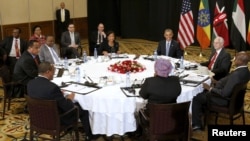During U.S President Barack Obama's recent trip to Ethiopia, he and regional leaders discussed options for restoring peace in South Sudan. They include sanctions and a “regional intervention force” to force both sides in the conflict to the negotiating table, but there are differing opinions on whether those options will work.
Puok Both Baluang, director of information of the rebel Sudan People's Liberation Movement and Army (SPLM/SPLA) Mission in Kenya, told VOA he doesn't think the proposed regional force would be of much use.
"Many countries they are debating about whose side they will support because they didn’t understand the nature or the foundation of that crisis," he said.
Dr. Emmanuel Kisiangani from the Institute for Security Studies, a global think tank, disagrees. He says sanctions and a regional force could indeed bring about peace.
"It depends on who constitutes that force," he said. "We already have Uganda inside South Sudan and I’m not sure to what extent the parties will see it as a neutral force, so it depends on who constitutes that if you have actors who are not siding with any of the parties I think it can play a role in terms of promoting cease-fire which is necessary at least to rebuilding the country and also for peace building efforts."
Since December 2013, inter-ethnic violence has gripped South Sudan leaving thousands dead. Regional efforts by IGAD, the East Africa regional bloc, have not led to a cessation of the war.
South Sudan's warring factions face sanctions and other measures if a peace agreement is not reached by August 17.







